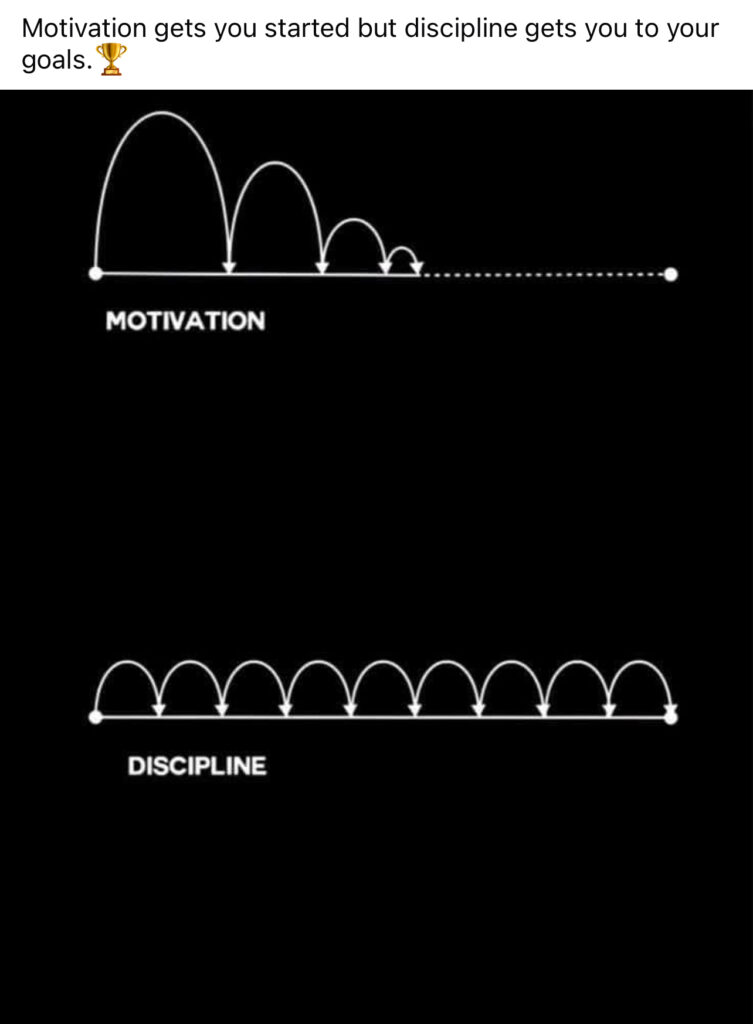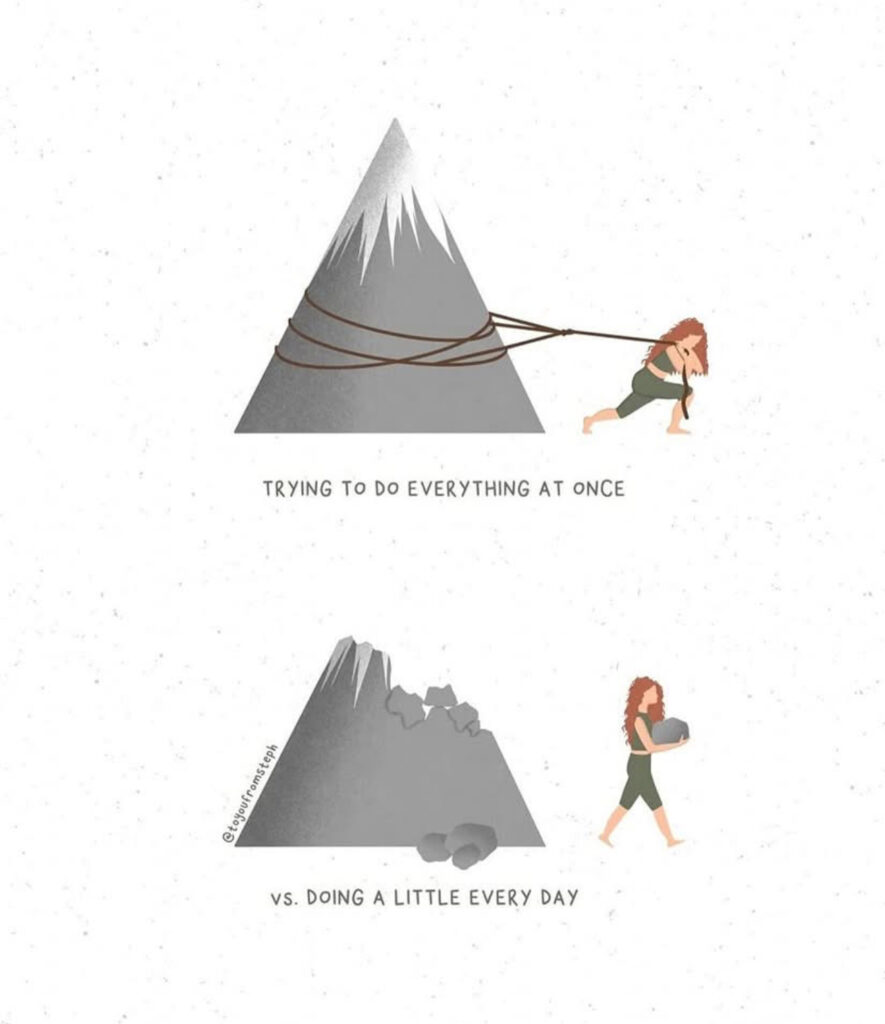Achieve New Habits By The End of The Year And Create Unstoppable Momentum
You’ve come so far, and the end of the year is your moment to shine. Think about all the progress you’ve made, the challenges you’ve overcome, and the potential waiting to be unlocked. This is your time to focus, prioritize, and finish strong. Every small step you take today builds momentum toward your bigger vision. Stay consistent, stay disciplined, and trust your ability to achieve what you set out to do. You’re capable…resilient…and closer than ever to making those habits a reality—go for it! and if this is your first time setting habits don’t wait for a new year to start today is the day to start whether its January, May, September heck even December. Start now! with a vision of the new habits you want to achieve. Keep reading down below to use these simple tools to kickstart you into a future of the best version of you!

Motivation vs Discipline
When it comes to achieving our new habits—whether it’s training for a half marathon, advancing in our careers, or sticking to a healthier lifestyle—there’s an age-old debate: motivation vs. discipline. While they often go hand in hand, understanding the difference between the two can be the game-changer you need to keep moving forward, especially when the going gets tough.
Motivation: The Spark
Motivation is that burst of energy or excitement you feel when starting something new. It’s the emotional drive that gets you out of bed for that early morning run or pushes you to tackle a challenging project. It’s powerful, but it’s also fleeting.
Motivation thrives on external or internal triggers:
• External Motivation: Seeing a friend crush their fitness goals, reading an inspiring book, or even hearing an encouraging word.
• Internal Motivation: A deep desire to feel better, look better, or accomplish something meaningful.
The problem? Motivation can fade. You won’t always feel excited to lace up your running shoes, and there will be days when hitting the snooze button feels more appealing than hitting the pavement.
Discipline: The Foundation
Discipline, on the other hand, is what keeps you going when motivation fizzles out. It’s the practice of showing up even when you don’t feel like it. Unlike motivation, discipline doesn’t rely on how you feel in the moment. It’s about commitment and consistency.
Discipline builds through small, daily habits:
• Setting a schedule and sticking to it.
• Choosing actions aligned with your desired new habits, even when they’re inconvenient.
• Trusting the process, knowing results take time.
Discipline is less glamorous than motivation. It’s not about grand gestures or emotional highs; it’s about quietly doing the work day after day. It’s about having integrity one of my most favorite quotes and one I live by is “Integrity= what you do when no one is watching. Learning to be truthful to you is one of the most important things you can do for yourself. It’s you against you! once you master the fight against you everything else becomes more joyous.

Why You Need Both
Motivation may start the fire, but discipline keeps it burning. Without motivation, you might never begin. Without discipline, you’ll struggle to finish.
Consider training for a half marathon:
• Motivation gets you excited about signing up for the race and imagining yourself crossing the finish line.
• Discipline ensures you stick to your training plan, even when it’s raining, you’re tired, or progress feels slow.
When paired together, motivation and discipline create unstoppable momentum. Motivation ignites your “why,” and discipline ensures you honor it, no matter what.
Tips to Balance Both
1. Reignite Motivation Regularly:
• Revisit your “why” by visualizing your goal to achieve a new habit.
• Celebrate small wins to remind yourself of your progress.
• Surround yourself with inspiring people, content, and environments.
2. Strengthen Your Discipline:
• Set a schedule: Treat your commitments like non-negotiable appointments.
• Start small: Build discipline by mastering one habit at a time.
• Embrace discomfort: Growth happens when you push past resistance.
3. Be Flexible:
Understand that motivation and discipline will ebb and flow. Some days, motivation will carry you. Other days, discipline will have to do the heavy lifting.

Change Your Goals into Habits
The biggest takeaway from Atomic Habits by James Clear is that small, consistent improvements lead to remarkable results over time. Clear emphasizes that success is not about making huge changes all at once but about refining daily habits by just 1% each day. Over time, these small improvements compound, leading to significant progress.
Some key ideas include:
The Plateau of Latent Potential: Progress isn’t always immediately visible, but consistent effort leads to breakthroughs.
Identity-Based Habits: Instead of focusing on goals, focus on becoming the type of person who achieves those goals (e.g., “I am a healthy person” instead of “I want to lose weight”).
The 4 Laws of Behavior Change: Make habits obvious, attractive, easy, and satisfying to reinforce good behaviors.
The Power of Environment: Shape your surroundings to make good habits easier and bad habits harder.

Final Thoughts
Motivation might bring you to the starting line, but discipline will carry you across the finish. When you combine the spark of motivation with the steady rhythm of discipline, there’s no limit to what you can achieve.
Whether you’re preparing for a half marathon or tackling a new challenge, remember: It’s not about being perfect every day—it’s about showing up consistently, no matter how you feel. That’s where the magic happens.
Now, take the first step. Your future self will thank you. If you’re looking for a sign to achieving your hearts deepest desires…this is it!

Good habits will make you more successful at work

Good habits will help you get physically/mentally strong

Good habits will help you find joy in life

Good habits help you change bad behavior
Disclaimer:
The information provided in this blog, Create Unstoppable Momentum with 3 Simple Ways to Achieve New Habits, is for educational and informational purposes only. It is not intended as professional advice, nor should it replace guidance from a qualified expert in health, psychology, or any other relevant field. Individual results may vary, and forming new habits requires personal effort, consistency, and adaptation to your unique circumstances. Always consult with a professional before making significant changes to your routine or lifestyle. The author and publisher are not responsible for any outcomes resulting from the application of the strategies discussed in this blog.
Additionally, this post may contain affiliate links. If you purchase a book or product through these links, I may earn a small commission at no extra cost to you. This helps support the blog and allows me to continue sharing valuable content. Thank you for your support!










